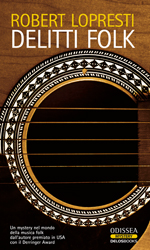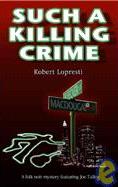Wednesday, June 11: Tune It or Die!
A FINE ITALIAN HAND
by Rob Lopresti
Sitting on my table is a book called Delitti Folk, published by Delos Books of Rome. It is a mystery, just published, and the author is listed as Robert Lopresti.
That’s pretty interesting, because I don’t speak (or write) Italian.
This is my first experience with being translated. (Well, occasionally a magazine has sent me a check because they sold the translation rights to a bunch of stories, mine included, but I have never seen the results before.) The adventure started when Delos Books contacted me last year, interested in the possibility of publishing my novel, Such A Killing Crime, in Italian.
This is probably one of the few times in my life that having a Sicilian last name worked in my favor.
Eventually the publisher (who, by the way, has been terrific throughout) sent me an electronic version of the text in Italian, translated by Roberto Chaivini. I took it to a man who is apparently the only native Italian speaker in my county (he teaches Japanese for a living, naturally) and asked him to read a few chapters to make sure it hadn’t been turned into a book about, I don’t know, spot-welding..
He assured me that Chaivini had a done a fine job. His only disagreement came when I had a policeman refer to an Irishman as a ‘Mick.’ The translator had turned it to ‘Mac,’ which my reader thought was more Scottish, but he couldn’t come up with a better term. Apparently the Italians don’t spend a lot of time insulting the Irish. Who knew?
Reading the fine print
Gary McKinney, my eagle-eyed American editor pointed out something I had missed: the book comes with scholarly apparatus. That is, my little novel has grown some footnotes! Which elements of American culture did the publisher think they need to explain to an Italian audience? I should explain that Such A Killing Crime is set in the folk music revival during
1963. Here are the subjects of some of the footnotes:
- The John Birch Society
Hatfield and McCoy
PT 109
Father Coughlin
Peter Stuyvesant
The Three Stooges.
They also explained Tonto and kemo sabe, whom I eccentrically placed a hundred pages apart, with no reference to the Lone Ranger in either case. And they explained skiffle club, which I suppose might baffle most Americans these days.
But the one weird footnote is Roy Cohn whom they identify as a member of the Royal Highlanders. Uh, no. He was Senator Joe McCarthy’s legal counsel.
Speaking of whom, they didn’t feel any need to explain Joe McCarthy, Ed Sullivan, or Carnegie Hall. We will get back to Delitti Folk (Folk Crimes; nice title) but first let’s talk about my camarati in the mystery field.
Paisans and poison
The first great Italian-American mystery writer (and oh, how he hated phrases like Italian-American) was Salvatore Albert Lombino. Finding it difficult to sell his stories in the early 1950s he created a pen name and discovered that editors who turned down work by Salvatore Lombino were more likely to buy from Evan Hunter. Under that name he wrote the bestseller The Blackboard Jungle; When he started writing mysteries he
used the name Ed McBain, but Evan Hunter was his legal name from the fifties on.
McBain was an MWA Grand Master, of course, and so is Bill Pronzini, the creator of a detective named Nameless. Robert Randisi is the founder of Private Eye Writers of America. Thomas F. Monteleone wrties mostly science fiction and horror but I include him because I love the title of his long-running column (which lived in Mystery Scene for a while): ‘The Mothers And Fathers Italian Association." Before his untimely death William DeAndrea wrote many mystery novels and a thoroughly opinionated column called "J’Accuse!" for the late great magazine Armchair Detective.
Lisa Scottoline writes legal thrillers and Killer Smile was inspired by the discovery of the alien registration cards her grandparents were required to carry during World War II. Did you know that some Italians were interned here?
And, oh yes, I hear a guy named Mario Puzo wrote a novel about organized crime. Apologies to all the worthies I have missed. Another thread from the web But what exactly does my translated novel say, anyway? Let’s see if we can use the Web to try to find out. Here are the first paragraphs of my novel as published in the, uh, canonical version, by Kearney Street Books: Until the mugging, the night was damned near perfect. The March air was clear and crisp and I was walking through Greenwich Village with a beautiful girl. She wasn’t my girl, true, but she was beautiful and she seemed to be enjoying my company. “Good God,” I said. “They’re opening another one.” I pointed across Third Street to an old storefront, now showing off a proud new sign: Café Santo. “Unbelievable,” said Carol Meisel. “Where do they all come from?” Now, Yahoo has a service called Babelfish Translations, which will translate a text or webpage from one language to another. It isn’t perfect by a long shot, and you don’t end up with literature, but it can usually give you some idea of what a text is trying to say. So I fed the same paragraphs from the Delos edition into Babelfish and asked it to translate the text from Italian to English. Till the aggression, it had been a nearly perfect night. The air marzolina was limpid and fresh and I walked for the Greenwich Village with a beautifulst girl. True, she was not my girl, but it was beautifulst and he seemed appreciate my company. – Good God – I said. – They are in order to open of an other. – I indicated beyond the Third Road the entrance of an old store that showed a new one proudly teaches: Saint Café. – Incredible – Carol Meisel said. – From where come all how many? I’m sure you will agree that that was one of the beautifulst translations you have ever come across. But we can go one step further. I took my original English text and had Babel Fish convert it to Italian and back into English without the benefit of a human translator. Here is the result: Until all’ aggression, the night has been cursed near perfect. L’ March air was clear and the fried patatine and I was walking I cross the Greenwich Village with a beautiful girl. She was not my girl, to align, but it was beautiful and he has seemed to enjoy my company. “Good God, I have said. “They are opening other. I have indicated through third via an old frontal room of store, now showing outside a new fierce sign: Saint Café. “Incredible, it has said the christmas song Meisel. “Where they make all come give? Where, indeed. The "fried patatine" had me baffled here until I realized that "crisp" is British English for potato chips. I’ll let you puzzle out the other mysteries in the text. So, that’s two countries down. Only 193 more to go. 























Ah, where is Anthony (the translator) Boucher when we need him! And let’s flip things over and note Umberto Eco’s Name Of The Rose. In any language I want to read this book!
Uh, by “this book,” I meant YOURS, Robert!!
Eco’s book is wonderful, but he ain’t exactly Italian-AMERICAN. I saw a book recently called CRIMINI, the best Italian mystery short stories. Haven’t purchased it yet, but I probably will next time I’m at the store.
Mark Twain’s Jumping Frog story was translated into French.
Train translated it back, verbatim, with hilarious results.
Yes, the Twain translation story is wonderful. And of course, it’s on the web: http://members.cox.net/deleyd/religion/solarmyth/frog.html
My friend Peter Berryman once ran a few Christmas carols through the Babelfish, translating them into French, then German, etc. and back into English. They are quite amazing. Who can forget “Rudolph the red-smelled annuitant?” Or “O! They improve the clock outside!” (because Santa Claus is coming to town.)
Pfui. Forgot to put in the link to Peter’s page:
http://members.aol.com/wzither/wzdec02.html